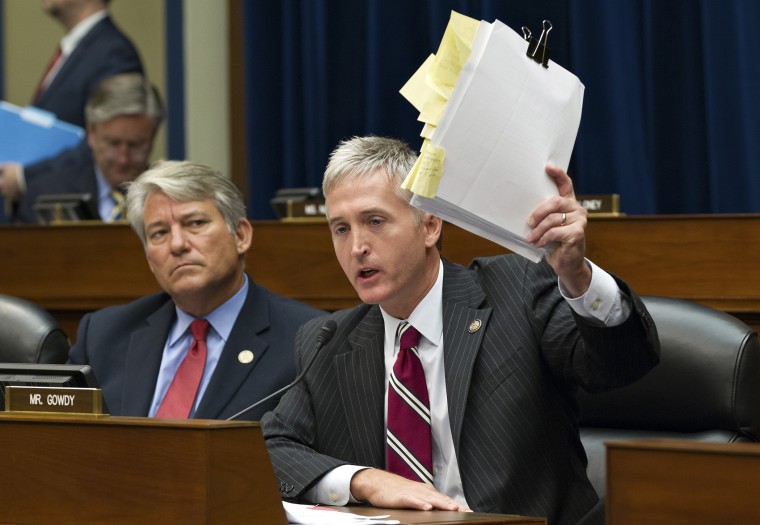The editorial board of the Wall Street Journal was not impressed with President Obama's recent video for BuzzFeed. In fact, the video, which been now seen nearly 50 million times, prompted the conservative editorial page to condemn both Obama and "supine and occasionally complicit news media that have seen you through six years of crisis, failure and scandal."
"Crisis"? Sure, every president faces crises, and Obama's no different. Some of this president's crises were even created by the WSJ's Republican friends on Capitol Hill. "Failure"? No obvious ones come to mind, except maybe Obama's efforts to get GOP lawmakers to compromise on any issue.
But the notion that the Obama presidency has featured "six years of scandal" seems bizarre. David Axelrod boasted this week, accurately, "I'm proud of the fact that basically you have had an administration in this place for six years in which there hasn't been a major scandal. And I think that says a lot about the ethical strictures of this administration."
This seemed like a fair thing to brag about, though some congressional Republicans appear to have a very different perspective.
At a Republican Party fundraising breakfast in his district on Wednesday, Representative Trey Gowdy suggested that the congressional GOP needed to investigate the IRS's scrutiny of political groups with the same intensity that it was investigating the 2012 attacks in Benghazi. "I'm glad that the speaker of the House convened a select committee on Benghazi," said Gowdy, a former prosecutor who chairs that panel. "I think it makes every bit as much sense to convene a select committee on the IRS. Now that we have the Senate, the Senate has tools the House doesn't have in terms of getting e-mails and cooperation. It has nothing to do with politics. Do you really want an IRS targeting you based on your political beliefs?"
Gowdy, the head of the eighth Benghazi committee, went on to tell Dave Weigel that "the same reasons for a select committee exist" in the IRS story as Benghazi, "or maybe even greater." He also complained about "Fast and Furious" and Solyndra because, well, he was apparently on a roll.
Remember, Sen. Lindsey Graham said earlier this month he wants to put Gowdy on the U.S. Supreme Court.
At a certain level, there's a kernel of truth to the far-right congressman's argument: select committees to investigate the IRS and Benghazi are equally sound. Which is to say, both ideas are equally ridiculous.
Paul Waldman once referred to the phenomenon as "scandal envy," and I can appreciate why it drives the GOP a little batty.
As we discussed a while back, it must be incredibly frustrating for the right that after six years, the near-constant search for a legitimate White House scandal has produced bupkis. Every few months, Republicans and some of the Beltway media are convinced they've uncovered "Obama's Watergate," but the controversies are always a mirage that disappears under scrutiny.
The IRS "scandal" turned out not to be a scandal at all, and after a year and a half of investigation from congressional Republicans, literally none of the GOP's allegations turned out to be true. Even by Congress' standards, the very idea of creating another select committee to investigate another discredited controversy is absurd.
Part of the underlying trouble here is a falsification problem. Republicans are certain the president is up to no good, and when there's no evidence to support their assumptions, they convince themselves that this proves how corrupt Obama is -- the rascally president must be hiding the proof of his misdeeds.
So they keep looking, which leads them to find nothing, which leads them to believe they better keep looking.
In other words, the lack of proof to substantiate what Republicans believe appears to have driven some in the party a little crazy.
Nixon had Watergate; Reagan had Iran-Contra; Clinton had Lewinsky; Bush had more scandals than he knew what to do with (Plame, the U.S. Attorney purge, torture, etc.). There's an expectation that every White House will invariably have to deal with its share of damaging controversies.
In reality, however, Obama just isn't cooperating in the scandal-creation department. His critics aren't wearing their desperation well.
